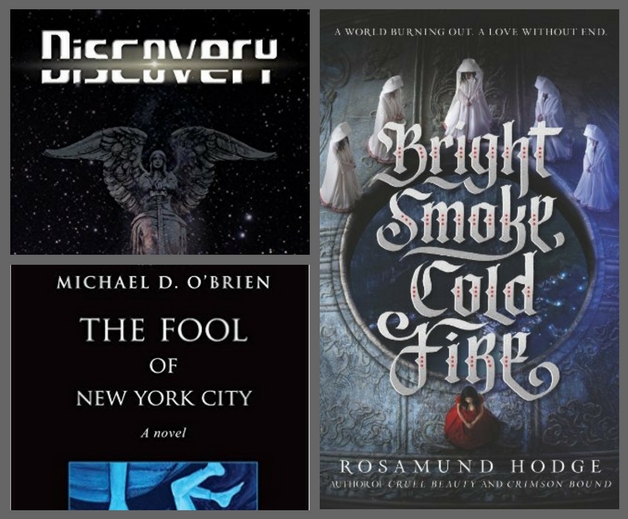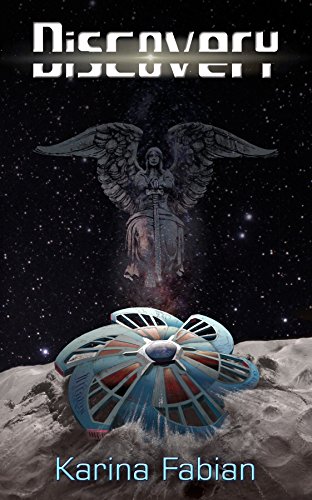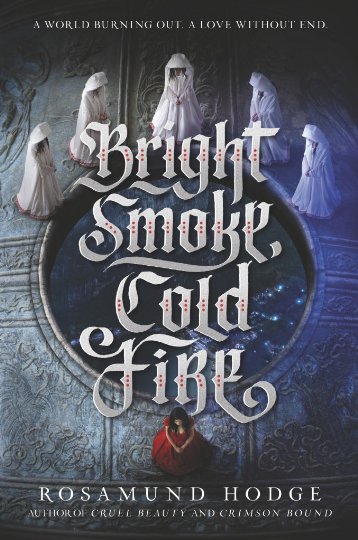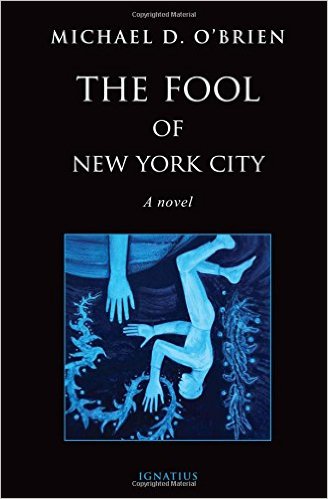Recent Fiction: Discovery; Bright Smoke, Cold Fire; Fool of New York City
Three new novels captured my imagination and have me excited to share.

This week, I bring you recent fiction reads and finds: three books that caught my imagination, kept me turning the pages, and made me want more.
Discovery

In the years that I’ve been following and reading Karina Fabian, I can say this: she puts the Catholic in sci-fi fantasy, and she does it with class, with flair, and with adventure. Her writing is tight, her characters are quirky, and her plots are mind-boggling.
Her latest, Discovery, had me delighted from the beginning. For one thing it has nuns in space.
Sit with that for a while. An order of nuns, the Rescue Sisters of St. Joseph de Cupertino, whose focus is in space.
A familiar voice said, “May I join you?”
James looked up and gaped at Rita. She wore the usual—or, to him, unusual—habit of her order: black T-shirt and pants over the standard skin suit, her lovely red hair uncovered and cut in short waves.
“Why don’t you cover your head?” he asked.
She huffed. “I’ll take that as a ‘yes,’ then?”
Remembering his manners, he stood and gestured to the seat opposite him.
“The habit is designed to work well in stations or ships and to make it easy to get into a spacesuit fast,” Rita explained as she settled into her seat and set her napkin on her lap. “There was talk in the early years about wearing the snoopy cap all the time, but it wasn’t worth it. The official reason was the unneeded extra wear on the equipment, but the unofficial story was that it made Saint Gillian’s head itch.”
Over the years, I’ve followed quite a few of the adventures of the Sisters in space, and a few of them, like Sister Ann, have become friends I meet again. This, though, is the first full-length novel with the Rescue Sisters in it; my other brushes with them have been short stories in collections Fabian has contributed to.
Discovery also has an alien spaceship and plenty of human drama. In fact, there’s an underlying mystery, at least two missions that I remember, and some great dialogue. Oh, and some romance. (Not much. But…some.)
The alien spaceship is the big pull, as high-dollar researches seek to cash in on the possibilities. The crew involved finds itself divided between the intellectuals, with the ideas and research, and the working class, who have the practical “how to get it done” knowledge. In the midst of this struggle, there’s the line between the ethical and moral boundaries that divide them in other ways.
Fabian crafts worlds and stories with the same care some people take with their holiday dinners or their artisan quilts. Her characters and plot interweave to make an experience that will make you want to revisit it and reread it and share it with others.
Deep space nuns, surreal adventures, and more than one mystery: Discovery will keep you turning the pages and longing for more.
Cold Smoke, Bright Fire

When I first heard of Rosamund Hodge, I didn’t realize I was jumping into YA fantasy…I just heard that she was a good writer.
After I read the first novel, I purchased the next two that were available, and I burned through them in a fit of fiction-induced bliss.
Seeing that Hodge has a new book out is akin to what I used to feel, years ago, when I saw that King or Koontz had novels in hardback. Her writing, though, is not horror, though it may be troubling and make you reconsider the world you live in.
Hodge, so far, has focused on reimagining fairy tales and classic works. Her latest, Cold Smoke, Bright Fire, is enough Romeo and Juliet for me to almost want to pick up Shakespeare (but oh how I hate reading screenplays).
When she hears the knock at her window, she realizes that she has been waiting for him.
In an instant she has bolted her door; in another, she has tied the mask back on her face. Then she draws her sword and opens the casement.
He is clinging to the balcony outside; he would surely have been caught and killed already, if not for the tree that grows so close to her window. There was a brief rainstorm after the revelry ended, and his hair clings to his pale forehead in damp, dark strands.
He is startled when she holds the sword to his neck, and she shivers as if she is startled too. When she looks at his dark eyes, nothing seems sure.
“You dance very well,” she tells him. “But you are my enemy.”
“Lady,” he says, “I am only a poor pilgrim, like those who once walked to this city barefoot and bleeding from the ends of the earth to fulfill their vows.”
She can’t stop the smile from tugging at her mouth. “Your people have always despised the gods, and mine despised Viyara. That is a very poor argument for me to let you live.”
“If you hate the pilgrims who vowed themselves to Viyara,” he says earnestly, “then corrupt me from my purpose, and make me yours.”
“You,” she tells him, “are utterly a fool. You know who I am. Why did you come?”
“Because,” he says, “I know you who you are.”
“Better than my father, who gave me this sword?”
“Yes,” he says.
The truth is, she feels that she knows him too, and when she looks at him, she feels as if she has a true name.
Bright Smoke has plenty of differences and special added features from Shakespeare: in the world of Hodge’s making, the city Viyara, the “Ruining” is coming, the world may fail at any moment, and the dead are coming back to life.
“The Juliet” is, in fact, a girl turned into a weapon through magic; Romeo believes her dead (as she believes him dead); and there are other characters who flesh things out in ways that would take me longer to explain than for you to read.
It’s a world, in some ways, that feels a little too close to home, and that’s where Hodge’s brilliance shines through. In a story that is so very clearly fantasy, she has tucked truths that apply to us in a world that could well be falling apart (but then, they said that 2000 years ago).
She was running out of time.
That was all Runajo could think, all day long. Somebody in the Cloister was murdering to gain magical power, and the High Priestess was doing absolutely nothing to protect the rest of them. That meant everyone was in danger, especially Runajo, since she had found the body. Somebody would gossip. And then whoever killed Atsaya would have reason to want Runajo gone.
Runajo didn't have a hope of catching the murderer first. So it didn’t matter how much of a coward she was, or how unlikely she was to survive the Sunken Library. She had to go now, while she was still breathing. Even if the thought made her hands go numb with terror.
But what was she to do with Juliet? It was no use leaving a note in her room, telling the Sisterhood to get Juliet out of her prison if Runajo didn’t come back. Since Runajo’s blood had made the room, only Runajo’s hands could open it.
She didn’t want to be a murderer. But that was what she would be, if she left Juliet locked in the room while she herself perished in the Sunken Library.
“What is it?” asked Juliet that evening. “Working yourself up to send me out for my first kill?” She threw out the words flippantly, as if they were nothing to her, but she didn’t meet Runajo’s eyes.
“No,” said Runajo, and remembered a throat torn open. She swallowed convulsively.
“Then what happened?” asked Juliet.
Runajo shrugged, trying to look like she didn’t care. “One of the Sisters is dead.”
Juliet shrugged. “So?”
“She was murdered. I know, because I found the body.” Runajo’s fingers twisted together and clenched.
“So?” said Juliet again, loud and irreverent and drowning out the memories. “Aren’t you all supposed to live as if already dead? What does it matter to you?”
Runajo looked back at her. “I didn’t know your people ever bothered to learn how we live.”
“‘What you would destroy, first love,’” said Juliet, in a prim voice that made it clear she was quoting something.
“Is that why you married Romeo?” asked Runajo.
She’d meant the words to sting, but for a moment Juliet’s expression was nothing but openmouthed pain, as if she were being gutted.
Runajo sighed. “Atsaya was murdered. Her throat was cut from ear to ear. But the High Priestess told everyone this morning that the gods inspired her to sacrifice herself. It’s not right. And people are going to die for it, because the murderer is still loose. Is it so very strange to you, that I might care?”
“Yes,” said Juliet. "What is one more death to you?"
“Well, you have only your ignorance to blame for that,” said Runajo. “And I know you were trained to kill, so you should stop pretending we are somehow more heartless.”
“I’m the sword of the Catresou,” said Juliet. “I was born to kill.”
“Anyone Lord Catresou tells you to,” said Runajo. “I know.”
“No,” said Juliet. “Anyone that justice tells me to. That’s what makes me different from you.”
This is the first of a duology, so if you thought you’d be caught at the end wanting more-more-MORE, you would be correct.
What’s interesting, though, is that this is the kind of YA fiction that I would share (and have shared) with the young people (and adults!) in my life. Hodge operates within an ethical and moral boundary that, while intense and perhaps more than a bit violent (hence it’s YA and not middle grade), is also realistic.
Which feels strange to say about a fantasy novel.
A challenge for me, I think, might be to read the original Shakespeare and tie the parallels in with Hodge’s writing. In fact, the inner teacher in me would love to see that done in a school setting…with all the tripe I’ve seen in reading lists in the last few years, here’s a novel to consider instead!
The Fool of New York City: A Novel

There aren’t many authors who do character development with the same thoroughness as Michael O’Brien.
And, say some of my reading pals, few use as many words as he does either.
I can only laugh, because however slowly his novels may move at times, he captures me with his prose and holds me.
His newest novel, The Fool of New York City, is one of the shorter books he’s written: at under 300 pages, it’s not even very hefty. The story within the covers, though, is filled with characters who you know and love by the end, who may fill your mind with their own stories if you let them.
I am desperate for the bathroom. I close its door and take care to slide its bolt into locked position. Are there dimensions to the personalities of giants that are better left unknown? He could have overpowered me but has chosen not to do so. This tells me something. Though I do not feel safe, neither do I feel unsafe. His name is Billy, like a little boy strolling through a wheat field. My name is Francisco, like a little boy on a donkey revolving around a grape press. Or a darker Francisco wrestling with the witches embedded in oil paint. Beyond that, nothing is certain.
My face in the mirror is disturbing. Who are you? The eyes tell me nothing, large and brown with black lashes and brows. A head full of heavy dark curls. Olive skinned. Am I Italian? Or Middle Eastern?
Francisco is found by Billy, and the two become friends. Billy takes care of Francisco and tries to help him remember his life; because of his amnesia, he’s convinced he is Francisco de Goya (as in the 18th century painter) and just aging a lot differently than the rest of the world.
O’Brien’s characters are long on character: Billy is at least 7 feet tall, lives in an abandoned building that he’s remodeling, keeps hens on the roof, and views himself as a rescuer. He’s simple in a way that’s pure innocence and good in a way that’s sheer saint.
And if I’m talking as though I’ve met him, it’s because that’s how I feel after reading this book, that I met Billy Revere and shared some omelets with him, perhaps watched him as he jogged through Central Park.
Francisco eventually finds his way into his true identity, thanks to Billy’s patient support and help. There’s even a bit of a “happily ever after” to this (not so un-O’Brien-like, that)…but not without some wondering.
There were parts of this story that were harrowing and there’s a depth of feeling that I appreciated…I didn’t relate with the specifics, but there’s a mourning and a sorrowing within the story, central to both the main characters, that is, quite possibly, very human. It’s beautifully extracted and woven together in a beautiful tapestry.

















